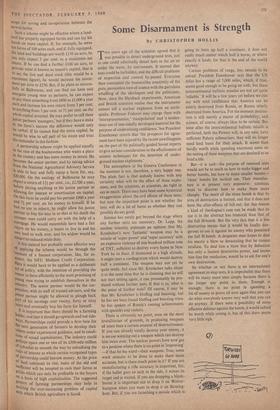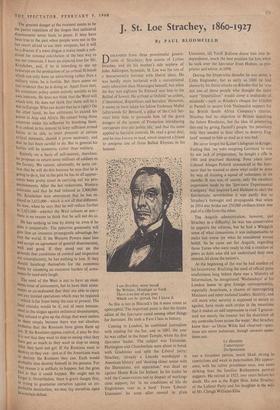Some Disarmament is Strength
By CHRISTOPHER HOLLIS
rr wo years ago all the scientists agreed that it I was possible to detect underground tests, just as one could admittedly detect tests in the air or under the water, by instruments. It seemed that tests could be forbidden, and the difficult problems of inspection and control by-passed. Everyone then contrasted the businesslike unanimity of the pure, passionless men of science with the garrulous whaffling of the ideologues and the politicians. Now, since the Hardtack experiments, American and British scientists realise that the instruments cannot tell a nuclear explosion from an earth- quake. Professor Fedorov may charge them with `misrepresentation,' manipulation' and 'a tenden- tious use of one-sidedly developed material for the purpose of undermining confidence,' but President Eisenhower retorts that 'the prospects for agree- ment have been injured by the recent unwillingness on the part of the politically guided Soviet experts to give serious consideration to the effectiveness of seismic techniques for the detection of under- ground nuclear explosions.'
The atmosphere at the Geneva Conference at the moment is not, therefore, a very happy one. The plain fact is that nobody knows with any certainty what will be the effect of these explo- sions, and the scientists, as scientists, do right to say as much. There may have been some hysterical exaggeration about the evil effects of these tests; but now the important point is not whether the tests will do a lot of harm as whether they can possibly do any good.
Science has surely got beyond the stage where any further tests are necessary. Dr. Lapp, the nuclear scientist, expresses an opinion that Mr. Krushchev's new 'fantastic' weapon may be a missile of 'super power' and 'super accuracy' with an explosive violence of one hundred million tons of TNT, sufficient to destroy every home in New York by its blast. If detonated at a high altitude, it might start a conflagration which would destroy half a continent. The weapon may not yet be quite ready, but since Mr. Krushchev talks about it at the same time that he is claiming that he will not start testing again, it can presumably be pro- duced without further tests. If that is so, what is the point of further tests? Of course, it may be that Mr. Krushchev is bluffing and boasting; but he has not been found bluffing and boasting when he has spoken of Russia's coming achievements with sputniks and rockets.
There is obviously no point, even on the most brutalitarian of grounds, in producing weapons of more than a certain amount of destructiveness. If you can already totally destroy your enemy, it is no use working out a weapon which can destroy him twice over. The nuclear powers have now got to a position where there is no point in 'improving' —if that be the word—their weapons. True, some work remains to be done to make them more accurate, but is there much point in it? If you are manufacturing a rifle accuracy is important, for, if the bullet goes an inch to the side, it misses its target and is wasted. if you are dropping a block- buster it is important not to drop it on Wolver- hampton when you want to drop it on Birming- ham. But, if you are launching a missile which is going to burn up half a continent, it does not really much matter which half it burns, or where exactly it lands; for that is the end of the world anyway.
Certain problems of range, too, remain to be solved. President Eisenhower says that the US Atlas has a range of 5,000 miles, which, if true, seems good enough to be going on with; but these intercontinental ballistic missiles are not yet quite 'reliable.' It will be a few years yet before we can say with total confidence that America can be utterly destroyed from Russia, or Russia utterly destroyed from America. For the moment destruc- tion is still merely a matter of probability; and science, of course, always likes to be certain. But soon after the intercontinental ballistic missile is perfected, both the Powers will, in any case, have sufficient Polaris submarines; they will no longer need land bases for their attack. It seems then hardly worth while spending enormous sums on the testing of these weapons that are destined to so' brief a life.
But—it is said—the purpose of resumed tests would not be to teach us how to make bigger and better bombs, but how to make smaller bombs— 'clean' bombs for tactical use. Their manufac- ture is at present very expensive: scientists want to discover how to make them more cheaply. The merit of the clean bomb is that its area of destruction is limited, and that it does not have the after-effects of fall-out; for this reason a kind of theologian's case can be made that its use is in the abstract less immoral than that of the full H-bomb. But the very fact that it is less destructive means that it would be fatally dan- gerous to use it against an enemy who possessed the full H-bomb. A desperate man hopes to deal his enemy a blow so devastating that he cannot retaliate. To deal him a blow that by definition has only a limited destructive power, and leaves him free for retaliation, would be to ask'for own destruction.
So whether or not there is an international agreement to stop tests, it is improbable that there will be many more tests simply because there is no longer any point in them. Enough is enough; there is no point in spending a lot of money to prove all over again that you can do what everybody knows very well that you can do anyway. If there were a possibility of some effective defence against the bomb, it would indeed be worth while testing it, but of this there seems very little sign. The greatest danger at the moment seems to be the parrot repetition of the slogan that unilateral disarmament never leads to peace. It may have been true in the past when people were not in the last resort afraid to use their weapons, but it will be a disaster if a mere slogan is today made a sub- stitute for rational calculation of the best way to use our resources. I have no especial love for Mr. Krushchev, and, if he is intending to use up resources on the production of an orbital H-bomb which can only have an advertising rather than a military value, he is foolish. But there seems no real evidence that he is doing so. Apart from that, his armament policy seems entirely sensible in his own interests. He does not think that the West will attack him. He does not think that there will be a war in Europe. Who can doubt that he is right? On the other hand, he has ambitions to extend his power in Asia and Africa. He cannot bring those countries under his influence by bombing them. It is indeed to his interest to keep sufficient armed forces to be able to exert pressure at certain critical moments, should it prove necessary, and that he has been careful to do. But in general his battles will be economic rather than military.
Entirely on a basis of self-interest, therefore, he proposes to return some millions of soldiers to the factory. We cannot, admittedly, be quite cer- tam that he will do this because he says that he is going to do it, but in the past he has to all appear- ances been pretty exact in carrying out his pro- nouncements. After the last reductions, Western estimates said that he had reduced to 3,900,000. Mr. Krushchev now announces that he has re- duced to 3,623,000—which is not all that different. So now, when he says that he will reduce further to 2,423,000—whether the West reduces or not— there is no reason to think that he will not do so.
He has nothing to lose by doing so, even if he does it unilaterally. The apparent generosity will give him an immense propaganda advantage be- fore the world. If the Western Powers meet him and accept an agreement of general disarmament, well and good. If they stand out on the grounds that conditions of control and inspection are unsatisfactory, he has nothing to lose. If they should handicap themselves for the economic battle by assuming an excessive burden of arma- ments he need only laugh.
The need of the West is not to have an enor- mous total of armaments, but to have their arma- ments so co-ordinated that they are able to carry out any limited operations which may be required which is far from being the case at present. The fatal mistake would be if, out of mere bemuse- ment at the slogan against unilateral disarmament, they refused to give up the things that were useless to them simply because there was not absolute evidence that the Russians have given them up too. If the Russians oppose control, it may be that it is not that they want to stop us seeing what they have got so much as they want to stop us seeing what they have not got. If the Russians want to destroy us they can—just as if the Americans want to destroy the Russians they can. Each would Probably also destroy himself in the process. For that reason it is unlikely to happen, but the grim fact is that it could happen. We ought not to forget it. Nevertheless, there is grave danger that, in trying to guarantee ourselves against an im- probable destruction, we may lay ourselves open to a certain defeat.











































 Previous page
Previous page